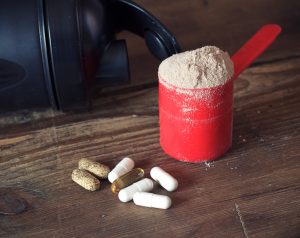Written by Jessica Patella, ND. Compared to placebo, whey protein isolate (WPI) improved cardiovascular function in older adults, but had no significant effect on cerebrovascular or neurocognitive function.
 One of the effects of aging is reduction of the elastic qualities in the vasculature of the body. This is more commonly referred to as “stiffening of the arteries” which results in elevated blood pressure and altered blood flow to vital organs, such as the kidneys, heart and brain. This increase in arterial stiffness can eventually result in events such as heart attacks and strokes 1,2, but it also can affect cognitive functioning 1,3. Recent research investigated if supplementing whey protein in the diet could affect arterial stiffness and cognitive and cerebrovascular functioning in older adults 1.
One of the effects of aging is reduction of the elastic qualities in the vasculature of the body. This is more commonly referred to as “stiffening of the arteries” which results in elevated blood pressure and altered blood flow to vital organs, such as the kidneys, heart and brain. This increase in arterial stiffness can eventually result in events such as heart attacks and strokes 1,2, but it also can affect cognitive functioning 1,3. Recent research investigated if supplementing whey protein in the diet could affect arterial stiffness and cognitive and cerebrovascular functioning in older adults 1.
Whey protein comes from one of the proteins found in milk 1. Whey protein contains angiotensin converting enzyme (ACE) inhibitor peptides and is a source of l-arginine, a blood vessel dilator that can convert to nitric oxide1. Past research suggests whey can affect endothelial function in the vessels 4, which is why it was chosen for further study 1.
The research included 99 community dwelling older adults (67 yrs. +/- 6) that were randomly assigned to either 50g daily of whey protein isolate (NOW Foods Brand whey protein isolate) or a carbohydrate (isocaloric) control (NOW Foods Brand, Carbogain, maltodextrin), for 12 weeks. Both groups were instructed to consume two servings of 25g (50g/day, 100kcal/serving) and maintain their habitual diet and exercise for the 12-week period.
The results were as follows:
- Carotid-femoral pulse wave velocity (a measure of aortic stiffness) increased slightly in the carbohydrate group and showed a statistically significant decrease in the whey protein group (p<0.05).
- The effect on reducing aortic stiffness observed in the whey group (about -0.5m/s) may help reduce cardiovascular risk (when compared to the about +0.5 m/s in the carbohydrate group). A difference of 1.0 m/s is associated with a 15% reduction in cardiovascular risk 2.
- No effects on carotid artery function were observed in either group.
- Systolic blood pressure X Heart rate decreased significantly in the whey protein group (p<0.05) and showed no change in the carbohydrate group.
- Whey protein supplementation did not show significant changes in cognitive functioning measures. Yet, emotional recognition (a measure of general cognition) selectively improved in the whey protein group (p<0.05) only.
In conclusion, whey protein only showed a modest effect on aortic stiffness and cardiovascular measures in older community dwelling adults. There was not significant evidence of an effect on cognitive functioning 1. It is important to note this research was funded by the Dairy Research Institute 1.
Source: Lefferts, Wesley K., Jacqueline A. Augustine, Nicole L. Spartano, William E. Hughes, Matthew C. Babcock, Brigid K. Heenan, and Kevin S. Heffernan. “Effects of Whey Protein Supplementation on Aortic Stiffness, Cerebral Blood Flow, and Cognitive Function in Community-Dwelling Older Adults: Findings from the ANCHORS A-WHEY Clinical Trial.” Nutrients 12, no. 4 (2020): 1054.
© 2020 by the authors. Licensee MDPI, Basel, Switzerland. This article is an open access article distributed under the terms and conditions of the Creative Commons Attribution (CC BY) license (http://creativecommons.org/licenses/by/4.0/).
Click here to read the full text study.
Posted May 5, 2020.
References:
- Lefferts WK, Augustine JA, Spartano NL, et al. Effects of Whey Protein Supplementation on Aortic Stiffness, Cerebral Blood Flow, and Cognitive Function in Community-Dwelling Older Adults: Findings from the ANCHORS A-WHEY Clinical Trial. Nutrients. 2020;12(4).
- Vlachopoulos C, Aznaouridis K, Stefanadis C. Prediction of cardiovascular events and all-cause mortality with arterial stiffness: a systematic review and meta-analysis. J Am Coll Cardiol. 2010;55(13):1318-1327.
- Alvarez-Bueno C, Cunha PG, Martinez-Vizcaino V, et al. Arterial Stiffness and Cognition Among Adults: A Systematic Review and Meta-Analysis of Observational and Longitudinal Studies. J Am Heart Assoc. 2020;9(5):e014621.
- Townsend RR, Wilkinson IB, Schiffrin EL, et al. Recommendations for Improving and Standardizing Vascular Research on Arterial Stiffness: A Scientific Statement From the American Heart Association. Hypertension. 2015;66(3):698-722.

